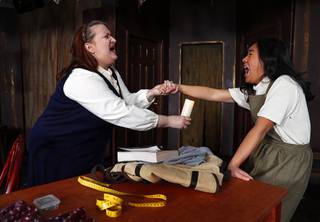When theatrical performances are your livelihood, you find the means to continue with the arts.
For Majestic Repertory Theatre in downtown Las Vegas, that has translated into producing experimental shows during the shutdown brought on by the pandemic, whether it’s drive-thru shows in the venue’s parking lot or hosting plays in front yards for families to watch from inside their homes.
“We’ve been very creative in ways of continuing to create and tell stories and keeping actors employed, while being safe. It’s just not enough to keep the entire organization afloat,” said Troy Heard, the theater’s artistic director.
In a normal year, the company’s major source of revenue comes from ticket sales from performances such “Sweeney Todd” and “American Idiot” in the quaint 99-seat theater. But the pandemic has limited the shows — and therefore crippled the business financially.
Help appears to be on the way as Congress included $15 billion for small art and entertainment venues as part of a $900 billion coronavirus relief package. The bill is on President Donald Trump’s desk for approval, although he has indicated he would like it sent back to Congress for revisions that shouldn’t impact the arts.
It’s the largest public rescue of arts in history with individual grants capped at $10 million.
Independent venues — bars, music venues, theater companies and more — that lost at least 25% of their income because of closures can apply for a federal grant from the Small Business Administration to provide six months of pay to employees and cover rent, utilities and maintenance. Venues that lost more than 90% can apply first, starting within two weeks of the bill becoming law.
Majestic will use the funds to pay actors and stage crew, Heard said.
“A lot of people don’t realize the entertainment you consume is not sprung forth out of nothing. It takes a lot of work and craftsmanship. Many people are involved and haven’t been able to pay rent for eight months,” Heard said.
The 80-seat Vegas Theatre Company, formerly called Cockroach Theatre, hasn’t had a live performance since March 13. Because the venue is so intimate, there’s not enough space from the stage to the audience to safely host shows, even once the state loosened its limitation on live performance.
Daz Weller, executive artistic director of the company, said the stimulus money is a much-needed lifeline that would help pay rent.
The company is fortunate to still be in business, as the National Independent Venue Association reports that at least 300 music spots have shut down since the start of the pandemic, according to The New York Times. The association also reported that 90% of venues said they would be in danger of closing without federal aid.
Vegas Theatre Company has also received grant money from the city and state.
“We can survive until March on funding we received without having to go cap-in-hand to our sponsors and donors, and they have been great throughout this, but it would be tough to continue from there,” Weller said.
In a typical year, the Las Vegas Philharmonic produces about 10 concerts at the Smith Center for the Performing Arts, which has been closed since March. The Smith Center getting funding would have a trickle-down impact on other groups, said Donato Cabrera, the philharmonic’s conductor.
“Helping places like the Smith Center will ensure we have a place to come back to when we’re allowed to perform again,” Cabrera said.
Others in the Las Vegas arts and entertainment community are optimistic they'll be included in the bill, saying they are waiting for the final approvals before getting their hopes up.
Test Site Projects, a gallery and print shop at Commerce Street Studios, produces and sells limited-edition fine art prints for $500 to $5,000. The average customer is an art collector, but there haven’t been any customers lately.
“We’re making things, but we’ve had zero visitors and zero sales,” said Erik Beehn, the owner.
Beehn collaborates with visual artists to produce prints, then sells the prints and takes some of the proceeds. With no proceeds, it’s hard to afford production costs, which include expensive ink, acid developer and copper plates.
“I hope we can get some help this round, but I understand there are so many people out there that need help,” Beehn said.


